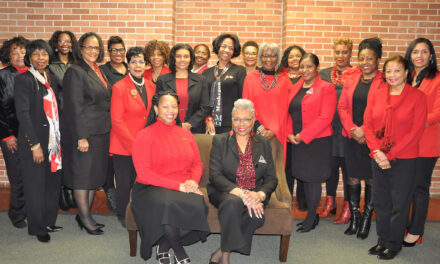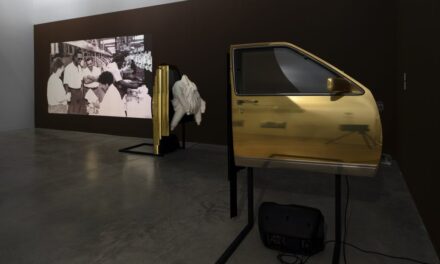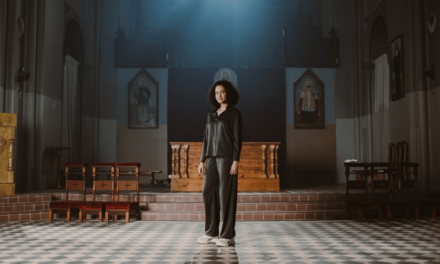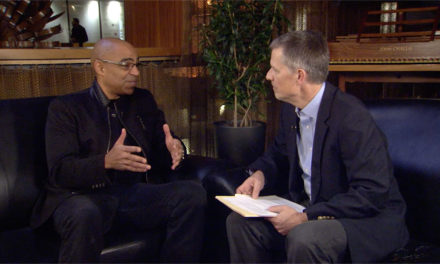The Wolverine Bar Association’s major fundraising event, the Barristers’ Ball, has returned after a two-year pandemic-related hiatus. Before this year’s Barristers’ Ball, titled “The Come Back,” host Stephen Henderson talks with Wolverine Bar President Kim Ward and retired judge Craig Strong, a recipient of the association’s Golden Gavel Award, about the importance of the association to the African American legal community in Michigan and how it supports aspiring lawyers and judge.
The Wolverine Bar Association, located in Detroit, began in 1930 to promote racial equality in legal matters for Detroit’s Black community. Today, the bar association provides a number of resources, programs and scholarships for young African Americans interested in pursuing a career in law.
Full Transcript:
Stephen Henderson: Kim, tell me two years of hiatus for the Barristers’ Ball. It’s going to be a lot of fun to get back together.
Kim Ward, President, Wolverine Bar Association: Definitely. Yes, that is the goal. We are excited to bring back the ball. It’s as you’ve indicated, it’s been two years. Everyone is excited. We’re actually almost nearly sold out on our table. So that is an indication of how excited everyone is to return. Of course, we’re returning back to the Marriott, which we know so well.
Kim Ward: The ball has been at the Marriott Detroit Renaissance Center for many, many years. This is our 60th and it means a lot to us. It’s a milestone year and it means that we have been planted firm, I would like to say, as a tree. We’ve grown out, our branches have extended over many, many years and this is one of our largest charitable events for the organization which our foundation puts on every year. So we’re looking forward to it as well. Hope to see you.
Stephen Henderson: Yeah. Let’s talk a little more about the Wolverine Bar Association, just how critical an institution that is here in the Detroit area.
Kim Ward: Sure, it’s paramount. As I’ve indicated, just alone just for the ball itself being its 60th annual. Of course, the organization itself goes back many, many years, as early as 1919, on which we were founded by the Harlan Law Club, which was the original name under the name of one of our U.S. Supreme Court Justice Harlan, who had a very, made a very bold decision, I would say, dissenting opinion in terms of equality, rights and segregation.
Kim Ward: So many, many years later, of course, the organization wanting to expand out and we’re talking about that growth. We wanted to stand out across the entire state. And Michigan being a Wolverine State, of course, the name Wolverine Bar Association was born. And as you’ve indicated, Stephen, it is very critical. It’s very critical for African-American attorneys as well as judges, as well as our law students.
Kim Ward: And the organization was founded for that purpose to assist with minority attorneys, as well as law students at the time who were looking to get into law school and just needed to have a good networking to be able to communicate, to be able to bounce things off of. And so the organization has grown to be able to create programs.
Kim Ward: So we’re pretty much large. We have since that time we can carry probably before Covid overall between 5 to 800 members per year. And so our ball is well attended and supported by the public and we’re continuing to grow in numbers even after the pandemic. As you’ve just indicated, we can tell that our numbers have increased since the two-year hiatus.
Stephen Henderson: So, Judge Strong, first of all, congratulations on receiving this award from the Wolverine Bar Association. It’s not the first award you’ve been given. But tell me how important it is to be honored this way.
Hon. Craig Strong, Honoree, Wolverine Bar Golden Gavel Award: Well, to me it’s important because it’s the organization that I love. I believe that I would not have been a judge at the time of my life, when I was 30, I got on the bench as a referee. But it was because of the Wolverine Bar. The fact that the Wolverine Bar allowed me to participate in so many activities and encouraged me and allowed me to expand and grow. Bar associations are very important. Bar associations actually control and shape the legal profession and influence so much, even the appointment of judges.
Hon. Craig Strong: And that’s one of the reasons why the Wolverine Bar became in existence, because the White Bar Association, the good old boys, would not let blacks in. So the blacks at that time determined that they needed to come together and form their own bar association, which they did. And they had their seminars, they helped each other.
Hon. Craig Strong: They got involved in civil rights issues, and they tried to break down the barriers of discrimination and racism in the court system, because back in those days, everything was white. White judges, white jurors, white police, white and court employees, and black folks didn’t feel they had a fair chance.
Hon. Craig Strong: So the Wolverine Bar Association basically was formed back in those days to knock down the barriers of racism, which they helped do. When we talk about the Barristers’ Ball, I look back at the days when the Wolverine Bar hosted a dinner and it would invite the white judges. And once again, they were trying to break down the barriers in the court system.
Hon. Craig Strong: And that evolved into the Barristers’ Ball, where it became a more of a social event. Where the lawyers can invite their spouses, they can entertain their clients, and the presidents would invite dignitaries, local and national. People that could help the members of the association, the association and the community. And I happened to have a photograph of the first Barristers’ Ball.
Stephen Henderson: Oh, my goodness. Look at that.
Hon. Craig Strong: The lawyer at the mic, who was the president at the time and he thought big. He just didn’t invite local people. I have a letter here from Robert Kennedy, who was the attorney general, the brother of President John Kennedy. And he was thanking the Wolverine Bar for inviting him to the event, but he was unable to do so.
Hon. Craig Strong: I also have another letter by him in which he is thanking the Wolverine Bar for endorsing the Honorable Wade McCree for appointment as the United States District Judge for the Eastern District of Michigan. You see. The Wolverine Bar just did not think local, it thought big. And we also have a letter from Justice Hastie. He was the first black federal judge.
Hon. Craig Strong: He was a judge in the Virgin Islands and the Wolverine Bar invited him to the Barristers’ Ball and paid his expenses. Wolverine Bar became the biggest social event around. The guest did not have to pay. They were the guests of the Wolverine Bar lawyers. And it was a place to be. It was featured in the newspapers. Everybody got dressed up, the women in great gowns, the newspapers covered the event, and people wanted to attend.
Hon. Craig Strong: One of the things that I thought was very important was the role of the president in inviting his or her guests, because these were dignitaries. These were people that could help out, and all the governors would show up. And the governors are the ones that make judicial appointments. So it was very important.
Hon. Craig Strong: As a matter of fact, I remember seeing Governor G. Mennen Williams, who appointed the first black judge. That was Charles Jones back in 1950. He would attend our balls. Governor Milliken who appointed more black judges than any governor would be in attendance. Everyone thought it was that important and it was because it helped break down barriers. It helped end stereotypes and it brought people together then and it still does now.
Stephen Henderson: Yeah, this is one of my things I absolutely love about Judge Strong is that he’s got such a command of history and remembers all the important things that happened to get us to get us where we are. Go ahead Kim Ward.
Kim Ward: Yeah, that’s exactly why Judge Strong is being honored and still as humble as he is, judge Strong was also a past president for Wolverine Bar Association, as well as for the Association of Black Judges of Michigan. So even in his retirement, he is still giving of himself, of history, of knowledge, as well as networking and mentoring to our students, which is so important and which is why we have the Barristers’ Ball.
Kim Ward: The money that we receive from that event definitely goes towards our law student programs, our pipeline programs. Some of those programs include our Judicial Externship Program, in which we try to place students into our circuit courts and our federal courts to give them the opportunity to work very closely as clerks for judges.
Kim Ward: We even have our summer clerkship program in which we provide students with the opportunities to work with them. Law departments, in-house departments, with law firms, giving them that on hands experience, putting them right into what a brief is, depositions, giving them that knowledge so that they are best prepared when they do graduate and walk into the legal profession.
Kim Ward: So we have a huge pipeline. You know, we try to make sure that our students are prepared to pass the bar. We have essay programs to strengthen their writing skills. We provide mock trials. We definitely place them into opportunities to even reach further back to our high school students as well as our undergraduate students by preparing them with law student I’m sorry, LSAT preparation exams.
Kim Ward: And so the foundation is huge in that sense. Also in terms of our membership, we have a great membership base. Our members have included not only Judge Strong as past president, but also Reginald Turner, who is currently the American Bar Association president, as well as Dennis Archer, and of course, I have to mention Victoria Roberts, chief judge, as well as the late Damon, Damon J. Keith.
Kim Ward: And I say that because we have scholarships that are named after them in which we provide scholarships to our students to help them through law school as well. So our organization is vast. We are definitely ready to do the work. We understand our community’s needs. We provide programs in terms of expungements, in terms of legal advocacy, voting rights. So we’re on the front line of standing for justice as well.
Kim Ward: And so having Judge Strong here with us to continue to assist on the board, as you know, he wears many hats. As you can tell, he’s very philanthropic and of course, fashion-forward. Everyone has seen him here in Detroit. And so definitely, you know, as many hats as he wears, we definitely tip our hats off to him. And so we are definitely happy to have him as one of our honorees amongst the other judges that we’re honoring as well, which definitely will include some of our federal and circuit court judges, you know, among Judge Strong.
Kim Ward: So we’re definitely happy to honor Denise Page Hood as well as Denise Langford Morris. Honorable Leo Bowman. We’re definitely happy to, of course, Judge Strong, as I mentioned, and we’re also honoring some local individuals that do civic and community work, which includes Shaheed Timothy, Aretha Franklin Theatre, formerly Shane Park, as well as our Congresswoman Brenda Lawrence. And we’re also honoring Reverend Kenneth J. Flowers for his activism on the legal front. So we have a number of people that we are honoring as well.
Stephen Henderson: All right. Well, again, congratulations, Judge Strong, and congratulations Kim Ward for bringing the Barristers’ Ball back. Thanks for being here with us, too.
Kim Ward and Hon. Craig Strong: Thank you.
Subscribe to Detroit Public Television’s YouTube Channel & Don’t miss American Black Journal on Tuesday at 7:30 p.m and Sunday at 9:30 a.m. on Detroit Public TV, WTVS-Channel 56.
Catch the daily conversations on our website, Facebook, Twitter and Instagram @amblackjournal.
View Past Episodes >
Watch American Black Journal on Tuesday at 7:30 p.m. and Sunday at 9:30 a.m. on Detroit Public TV, WTVS-Channel 56.




